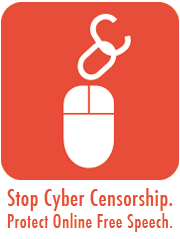 Magistrate courts in Ankara, Turkey, banned use of video-sharing site YouTube within the country on May 5, 2008. Within 2008, nine other websites were blocked by the courts, including Dailymotion and Google Groups.
Magistrate courts in Ankara, Turkey, banned use of video-sharing site YouTube within the country on May 5, 2008. Within 2008, nine other websites were blocked by the courts, including Dailymotion and Google Groups.
Since then, access to approximately 3,700 websites has been blocked under Law #5651, commonly known as the Internet Law of Turkey. Among other things, it prohibits websites which defame Kemal Atatürk, the founder and first president of the Republic of Turkey.
Last month, the editorial team of the Milliyet daily newspaper launched a protest campaign to fight the government’s censorship. It is not the first such campaign, but as Clothilde Le Coz, who works for Reporters Without Borders and reports about threats to journalists around the world, writes on PBS’ Media Shift blog:
[…] It’s notable because previous protests came from the blogosphere and, as a result, did not receive international coverage. The current ban is the fourth such action by the Turkish courts since 2007; hopefully, this campaign will draw attention to this policy of censorship.
Le Coz further reports that testimony given by Reporters Without Borders during a U.S. Congressional hearing noted that since last year, “Turkey has experienced a surge in cases of censorship, especially censorship of media that represent minorities [especially the Kurds].”
Turkey was not included on this year’s Enemies of the Internet list, compiled by Reporters Without Borders and published this past Friday. The country is now considered “Under Surveillance,” however, along with Russia, another new entry. On the list, the worst violators of freedom of expression online are Saudi Arabia, Burma, China, North Korea, Cuba, Egypt, Iran, Uzbekistan, Syria, Tunisia, Turkmenistan, and Vietnam. Other countries considered “Under Surveillance” are Australia (because of its upcoming Internet filtering system), South Korea, the United Arab Emirates, Belarus, and Thailand.
Source: “Turkish Reporters Unite to Protest YouTube Ban,” PBS’ Media Shift blog, 03/09/10
Logo for World Day Against Cyber Censorship used with permission.